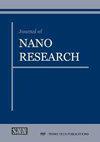Hydrothermally Synthesized Cu2ZnSnS4 Nanoparticles for Photocatalytic Degradation of Rhodamine B Dye
IF 1
4区 材料科学
Q4 MATERIALS SCIENCE, MULTIDISCIPLINARY
引用次数: 0
Abstract
Industrial dyes contained a wide range of organic compounds that could affect the environment and high dimensional challenges to humans. In recent years, the environmentally safe and inexpensive quaternary copper-based chalcogenide Cu2ZnSnS4 (CZTS) has emerged as a material for photovoltaics and photocatalysis. CZTS nanoparticles were prepared in this investigation using the hydrothermal route at 210 °C for 24 h without the addition of a surfactant or capping agents. Rhodamine B (RhB), a carcinogenic dye, was degraded using the synthesized material through a photocatalytic process. The structural, morphological, optical, and photocatalytic characteristics of CZTS nanoparticles were examined using X-ray diffraction (XRD), Raman spectroscopy, Field emission scanning electron microscopy (FE-SEM), and UV-vis spectroscopy. The average particle size of CZTS is found to be 31 nm with crystalline nature have been characterized by XRD. The results demonstrate that the synthesized sample has mixed morphological structures such as clew-like and flower-like structures and a bandgap of 1.50 eV. CZTS nanoparticles were used as photocatalysts under direct sunlight for Rhodamine B degradation, with the fastest degradation efficiency of 72% at 50 minutes. The results show that surfactant-free hydrothermally synthesized CZTS nanoparticles are a very promising material for the degradation of RhB dye due to the rapid degradation rate and high degradation efficiency.水热合成纳米Cu2ZnSnS4光催化降解罗丹明B染料
工业染料含有广泛的有机化合物,可能影响环境和对人类的高维挑战。近年来,环境安全、价格低廉的四元铜基硫系化合物Cu2ZnSnS4 (CZTS)成为一种用于光伏和光催化的材料。在不添加表面活性剂或封盖剂的情况下,采用水热法在210°C下制备了CZTS纳米颗粒。利用合成材料对致癌染料罗丹明B (RhB)进行光催化降解。采用x射线衍射(XRD)、拉曼光谱(Raman spectroscopy)、场发射扫描电镜(FE-SEM)和紫外可见光谱(UV-vis spectroscopy)研究了CZTS纳米颗粒的结构、形貌、光学和光催化特性。CZTS的平均粒径为31 nm,采用XRD对其进行了表征。结果表明,合成的样品具有线状和花状的混合结构,带隙为1.50 eV。利用CZTS纳米粒子作为光催化剂,在阳光直射下降解罗丹明B,在50分钟内降解效率最高,达到72%。结果表明,无表面活性剂水热合成的CZTS纳米颗粒降解速度快,降解效率高,是一种很有前途的降解RhB染料的材料。
本文章由计算机程序翻译,如有差异,请以英文原文为准。
求助全文
约1分钟内获得全文
求助全文
来源期刊

Journal of Nano Research
工程技术-材料科学:综合
CiteScore
2.40
自引率
5.90%
发文量
55
审稿时长
4 months
期刊介绍:
"Journal of Nano Research" (JNanoR) is a multidisciplinary journal, which publishes high quality scientific and engineering papers on all aspects of research in the area of nanoscience and nanotechnologies and wide practical application of achieved results.
"Journal of Nano Research" is one of the largest periodicals in the field of nanoscience and nanotechnologies. All papers are peer-reviewed and edited.
Authors retain the right to publish an extended and significantly updated version in another periodical.
 求助内容:
求助内容: 应助结果提醒方式:
应助结果提醒方式:


